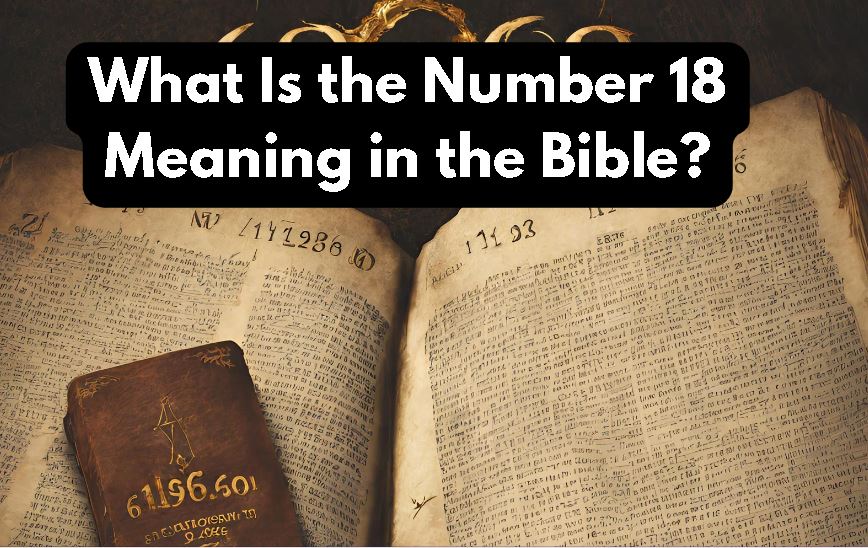Throughout Scripture, certain numbers convey symbolic meanings beyond just facts or measurements. The number eighteen is one example that communicates important spiritual themes. As we explore the significance of eighteen in the Bible, fascinating patterns emerge that reveal God’s redemptive work.
The Meaning Behind Biblical Numbers
Before diving into eighteen specifically, it helps to understand why numbers carry symbolic weight in the Bible. While some numbers function plainly as data points, other numbers communicate deeper truths.
For instance, three signifies the Trinity, seven represents spiritual perfection, ten connects to the Ten Commandments, and forty points to testing. Appreciating the significance of various numbers opens Scripture to richer meaning.
The Basics of Eighteen
At a simple level, eighteen combines one and eight. One indicates primacy and new beginnings. Eight suggests regeneration and eternity. Together, they signal a restart.
Eighteen relates to other meaningful numbers too. As nine times two, it evokes finality paired with contrast. And as three times six, it points to the divine Trinity despite human imperfection in the world.
Special Significance of Eighteen
Eighteen takes on special significance when by tracking the emergence of key words and themes across Scripture. For example, “light” surfaces for the 18th time when Moses encounters God’s glory (Exodus 34). “Love” appears for the 18th instance when Abraham offers Isaac in supreme devotion to God (Genesis 22). And God calls creation “very good” the 18th time the word “good” emerges in Genesis 1.
So this 18th repetition of significant terms seems strategically connected to formative spiritual events and messages.
Transitioning to Accountability at Eighteen
According to Jewish customs, eighteen marked the age when young men assumed adult duties. Fascinatingly, Jesus probably began His public ministry around age eighteen too. So even Jesus transitioned to spiritual responsibility around eighteen.
Key Themes in the 18th Bible Book: Job
The 18th book in Scripture is Job, which grapples with human suffering and retaining faith in God despite tremendous pain. Early in Job, symbolic numbers feature prominently, underscoring these core issues in the book:
- Job originally had seven sons and three daughters
- Four messengers come announcing Job’s loss
- After devastation, Job tears his robe and shaves his head with broken pottery
- Job loses 7,000 sheep, 3,000 camels, 500 oxen, 500 donkeys
- Job’s ten children then perish
This repeated use of numbers connected to suffering signals foundational spiritual themes explored in Job.
Only 300 Troops Remain of 18,000
In Judges 7, God reduces Gideon’s army from 32,000 down to just 300 troops before battling an opposing force of 135,000. This radical cut, leaving 1 percent of the original 18,000, prompts complete dependence on God rather than human capabilities to win the fight. God desires to display His glory rather than having the people glorify themselves.
Revival Under King Josiah at 18
When Josiah took Judah’s throne at age eight after his father’s death, the kingdom teetered on spiritual ruin. However, 2 Kings 22 reveals revival and covenant renewal under Josiah in the 18th year of his reign. Moreover, this 18th year mirrors Josiah reaching age eighteen biologically when young Jewish men assumed spiritual responsibility. So striking parallels emerge around the number eighteen with Josiah’s urgent reforms.
Additional Significant Uses of Eighteen
Beyond these main examples, here are two more cases where eighteen prominently surfaces:
- Ezekiel enacted an 18-month brick siege dramatizing Jerusalem’s coming exile (Ezekiel 4:1-8)
- Ezekiel’s temple vision incorporated 18 ribs or panels shielding God’s sacred presence (Ezekiel 41:5-26)
What We Can Learn from Eighteen
What key truths emerge from tracing eighteen through Scripture? First and foremost, God purposefully uses particular numbers as literary devices and symbols that point to His redemptive work across history.
Additionally, eighteen carries connotations of renewal and judgment, signaling pivotal junctures of God’s intervention. And eighteen reminds us, even when situations seem impossible, God overcomes daunting odds through those who trust in Him. For with God, a bright new day always dawns.
